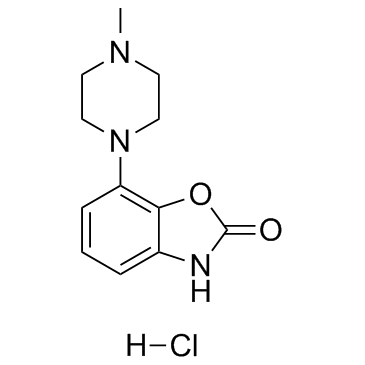Pardoprunox hydrochloride
Modify Date: 2025-08-25 16:03:26

Pardoprunox hydrochloride structure
|
Common Name | Pardoprunox hydrochloride | ||
|---|---|---|---|---|
| CAS Number | 269718-83-4 | Molecular Weight | 269.72700 | |
| Density | N/A | Boiling Point | N/A | |
| Molecular Formula | C12H16ClN3O2 | Melting Point | N/A | |
| MSDS | N/A | Flash Point | N/A | |
Use of Pardoprunox hydrochloridePardoprunox hydrochloride is a novel partial dopamine D2 and D3 receptor agonist and serotonin 5-HT1A receptor agonist, D2 (pKi = 8.1) and D3 receptor (pKi = 8.6) partial agonist and 5-HT1A receptor (pKi = 8.5) full agonist.IC50 value: 8.1/8.6/8.5 (pKi, for D2/ D3/5-HT1A receptor)Target: dopamine D2 and D3 receptor, 5-HT1A receptorin vitro: Pardoprunox also binds to D4 (pKi = 7.8), α1-adrenergic (pKi = 7.8), α2-adrenergic (pKi = 7.4), and 5-HT7 receptors (pKi = 7.2) with lower affinity. Pardoprunox acts as a potent but partial D(2) receptor agonist (pEC50 = 8.0 and pA2 = 8.4) with an efficacy of 50% on forskolin stimulated cAMP accumulation. At human recombinant dopamine D3 receptors, Pardoprunox acts as a partial agonist in the induction of [35S]GTPgammaS binding (intrinsic activity of 67%; pEC(50) = 9.2) and antagonized the dopamine induction of [35S]GTPgammaS binding (pA2 = 9.0). Pardoprunox acts as a full 5-HT1A receptor agonist on forskolin induced cAMP accumulation at cloned human 5-HT1A receptors but with low potency (pEC50 = 6.3) [1].in vivo: Pardoprunox induces contralateral turning behaviour in rats with unilateral 6-hydroxydopamine-induced lesions of the substantia nigra pars compacta (SNpc) (MED=0.03mg/kg; po). In MPTP-treated common marmosets, Pardoprunox dose-dependently increases locomotor activity (MED=0.03mg/kg; po) and decreases motor disability (MED=0.03mg/kg; po). In contrast Pardoprunox attenuated novelty-induced locomotor activity (MED=0.01mg/kg; po), (+)-amphetamine-induced hyperlocomotion (MED=0.3mg/kg; po) and apomorphine-induced climbing (MED=0.6mg/kg; po) in rodents. Pardoprunox also induces 5-HT1A receptor-mediated behaviours, including flat body posture and lower lip retraction (MED=0.3mg/kg; po). Collectively, these findings demonstrate that Pardoprunox possesses dopamine D2/3 partial agonist effects, 5-HT1A agonist effects and reduces parkinsonism in animal models. functional D2 receptor partial agonist activity and is effective in experimental models predictive of efficacy in PD.[2] |
| Name | 7-(4-methylpiperazin-1-yl)-3H-1,3-benzoxazol-2-one,hydrochloride |
|---|---|
| Synonym | More Synonyms |
| Description | Pardoprunox hydrochloride is a novel partial dopamine D2 and D3 receptor agonist and serotonin 5-HT1A receptor agonist, D2 (pKi = 8.1) and D3 receptor (pKi = 8.6) partial agonist and 5-HT1A receptor (pKi = 8.5) full agonist.IC50 value: 8.1/8.6/8.5 (pKi, for D2/ D3/5-HT1A receptor)Target: dopamine D2 and D3 receptor, 5-HT1A receptorin vitro: Pardoprunox also binds to D4 (pKi = 7.8), α1-adrenergic (pKi = 7.8), α2-adrenergic (pKi = 7.4), and 5-HT7 receptors (pKi = 7.2) with lower affinity. Pardoprunox acts as a potent but partial D(2) receptor agonist (pEC50 = 8.0 and pA2 = 8.4) with an efficacy of 50% on forskolin stimulated cAMP accumulation. At human recombinant dopamine D3 receptors, Pardoprunox acts as a partial agonist in the induction of [35S]GTPgammaS binding (intrinsic activity of 67%; pEC(50) = 9.2) and antagonized the dopamine induction of [35S]GTPgammaS binding (pA2 = 9.0). Pardoprunox acts as a full 5-HT1A receptor agonist on forskolin induced cAMP accumulation at cloned human 5-HT1A receptors but with low potency (pEC50 = 6.3) [1].in vivo: Pardoprunox induces contralateral turning behaviour in rats with unilateral 6-hydroxydopamine-induced lesions of the substantia nigra pars compacta (SNpc) (MED=0.03mg/kg; po). In MPTP-treated common marmosets, Pardoprunox dose-dependently increases locomotor activity (MED=0.03mg/kg; po) and decreases motor disability (MED=0.03mg/kg; po). In contrast Pardoprunox attenuated novelty-induced locomotor activity (MED=0.01mg/kg; po), (+)-amphetamine-induced hyperlocomotion (MED=0.3mg/kg; po) and apomorphine-induced climbing (MED=0.6mg/kg; po) in rodents. Pardoprunox also induces 5-HT1A receptor-mediated behaviours, including flat body posture and lower lip retraction (MED=0.3mg/kg; po). Collectively, these findings demonstrate that Pardoprunox possesses dopamine D2/3 partial agonist effects, 5-HT1A agonist effects and reduces parkinsonism in animal models. functional D2 receptor partial agonist activity and is effective in experimental models predictive of efficacy in PD.[2] |
|---|---|
| Related Catalog | |
| References |
| Molecular Formula | C12H16ClN3O2 |
|---|---|
| Molecular Weight | 269.72700 |
| Exact Mass | 269.09300 |
| PSA | 52.74000 |
| LogP | 2.09010 |
| InChIKey | NQRIKTDKFHAOKC-UHFFFAOYSA-N |
| SMILES | CN1CCN(c2cccc3[nH]c(=O)oc23)CC1.Cl |
| Storage condition | 2-8℃ |
| Pardoprunox hydrochloride |
| SME-308 |
| Pardoprunox hydrochloride (USAN) |
| SLV-308 |
| Pardoprunox.HCl(SLV-308) |
| Pardoprunox.HCl |